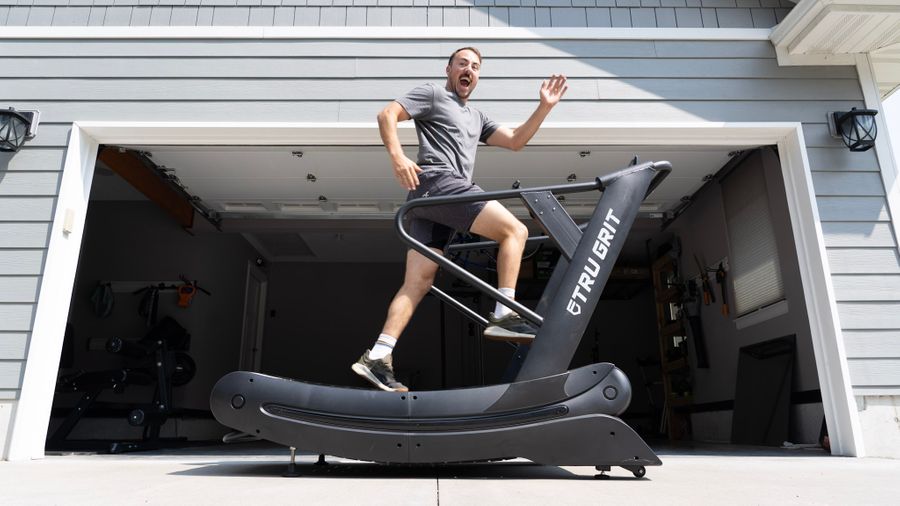We test and review fitness products based on an independent, multi-point methodology. If you use our links to purchase something, we may earn a commission. Read our disclosures.
Looking to become a better runner? Whether speed or distance is your goal, a GGR personal trainer has you covered.
Runners, rejoice: If you’re tired of making up your own workouts, these five workouts can carry you through some of your next few sessions. I created all of these workouts based on my experience as a personal trainer, former cross-country runner and running coach, and recently as a self-coached Olympic-distance triathlete.. From beginners to advanced athletes, this guide to treadmill workouts will help you reach your running goals.
This article is intended for informational and educational purposes only, and is not intended as a substitute for health or medical advice. For such advice, consult with an appropriate healthcare professional.
Pacing Guide
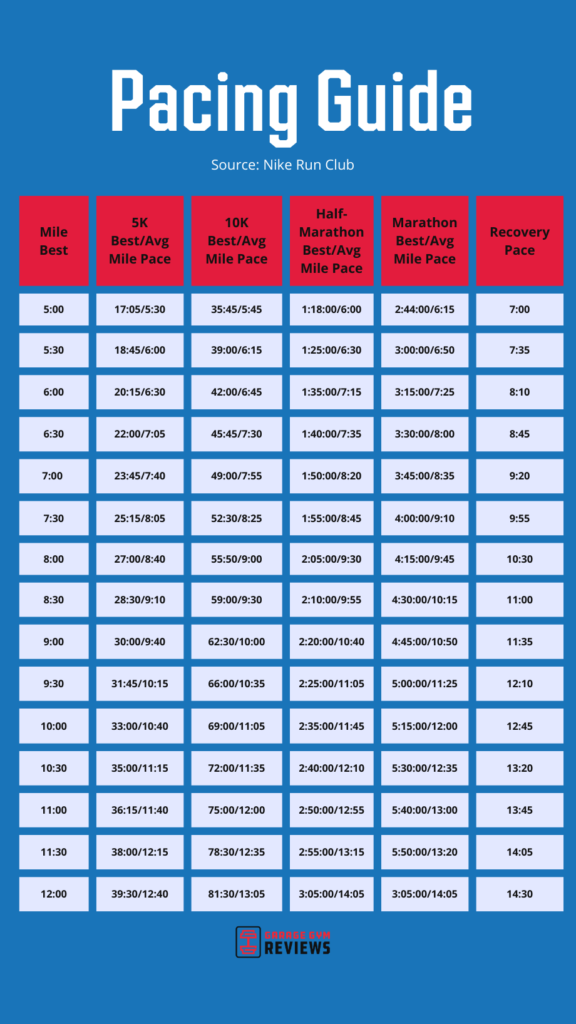
| Mile Best | 5K Best/Avg Mile Pace | 10K Best/Avg Mile Pace | Half-Marathon Best/Avg Mile Pace | Marathon Best/Avg Mile Pace | Recovery Pace |
| 5:00 | 17:05/5:30 | 35:45/5:45 | 1:18:00/6:00 | 2:44:00/6:15 | 7:00 |
| 5:30 | 18:45/6:00 | 39:00/6:15 | 1:25:00/6:30 | 3:00:00/6:50 | 7:35 |
| 6:00 | 20:15/6:30 | 42:00/6:45 | 1:35:00/7:15 | 3:15:00/7:25 | 8:10 |
| 6:30 | 22:00/7:05 | 45:45/7:30 | 1:40:00/7:35 | 3:30:00/8:00 | 8:45 |
| 7:00 | 23:45/7:40 | 49:00/7:55 | 1:50:00/8:20 | 3:45:00/8:35 | 9:20 |
| 7:30 | 25:15/8:05 | 52:30/8:25 | 1:55:00/8:45 | 4:00:00/9:10 | 9:55 |
| 8:00 | 27:00/8:40 | 55:50/9:00 | 2:05:00/9:30 | 4:15:00/9:45 | 10:30 |
| 8:30 | 28:30/9:10 | 59:00/9:30 | 2:10:00/9:55 | 4:30:00/10:15 | 11:00 |
| 9:00 | 30:00/9:40 | 62:30/10:00 | 2:20:00/10:40 | 4:45:00/10:50 | 11:35 |
| 9:30 | 31:45/10:15 | 66:00/10:35 | 2:25:00/11:05 | 5:00:00/11:25 | 12:10 |
| 10:00 | 33:00/10:40 | 69:00/11:05 | 2:35:00/11:45 | 5:15:00/12:00 | 12:45 |
| 10:30 | 35:00/11:15 | 72:00/11:35 | 2:40:00/12:10 | 5:30:00/12:35 | 13:20 |
| 11:00 | 36:15/11:40 | 75:00/12:00 | 2:50:00/12:55 | 5:40:00/13:00 | 13:45 |
| 11:30 | 38:00/12:15 | 78:30/12:35 | 2:55:00/13:15 | 5:50:00/13:20 | 14:05 |
| 12:00 | 39:30/12:40 | 81:30/13:05 | 3:05:00/14:05 | 6:00:00/13:45 | 14:30 |
This pace chart was originally created and provided by Nike Run Club.
How to Use This Pace Chart
Use your most recent personal bests and averages to determine the speeds you should run for indicated intervals in the following workouts.
For example, if the workout says to run for 3 minutes at your average 5K time, you can find the proper pace in a few ways:
- If you know your last 5K time, simply find it on the chart and run at the average mile pace indicated by that 5K time.
- If you know your best mile time, find that mile time on the chart and slide your finger across to the average 5K time in the same row as that mile time.
- If you know another race time of yours, such as a 10K or half-marathon, find those on the chart and then slide over to the corresponding 5K time.
Interval Treadmill Workout for Speed
Want to decrease your mile time, 5K time, or half-marathon time? Whatever distance you plan to race, this speed interval workout will help. You can make this workout longer or shorter by modifying the number of rounds you complete.
- Total time: 30 minutes
- Fitness level: Intermediate
- Effort level: Vigorous
Complete six rounds for a 30-minute workout.
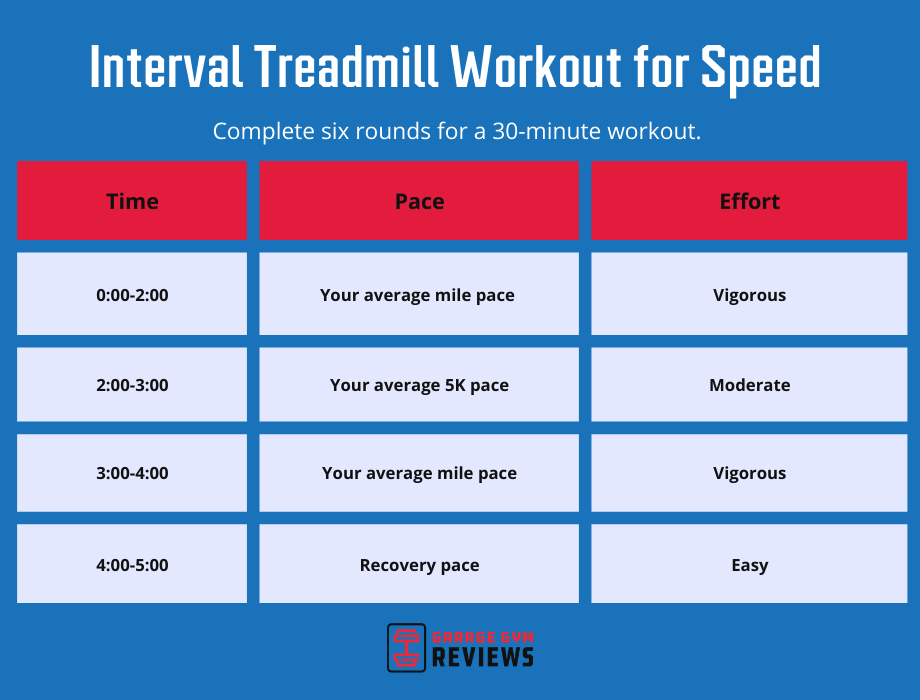
| Time | Pace | Effort |
| 0:00–2:00 | Your average mile pace | Vigorous |
| 2:00–3:00 | Your average 5K pace | Moderate |
| 3:00–4:00 | Your average mile pace | Vigorous |
| 4:00–5:00 | Recovery pace | Easy |
Treadmill Interval Workout for Endurance
Since this workout focuses on building endurance, it’ll be longer than the speed workout above. Allocate 45 to 60 minutes for this workout, depending on your needs and goals. The paces in this workout are slower, so it’s a good option for new runners to try (although beginners may want to reduce the number of rounds to two).
- Total time: 45 to 60 minutes
- Fitness level: All, but good for beginners
- Effort level: Moderate
Complete three rounds for a 45-minute workout and four rounds for a 60-minute workout.
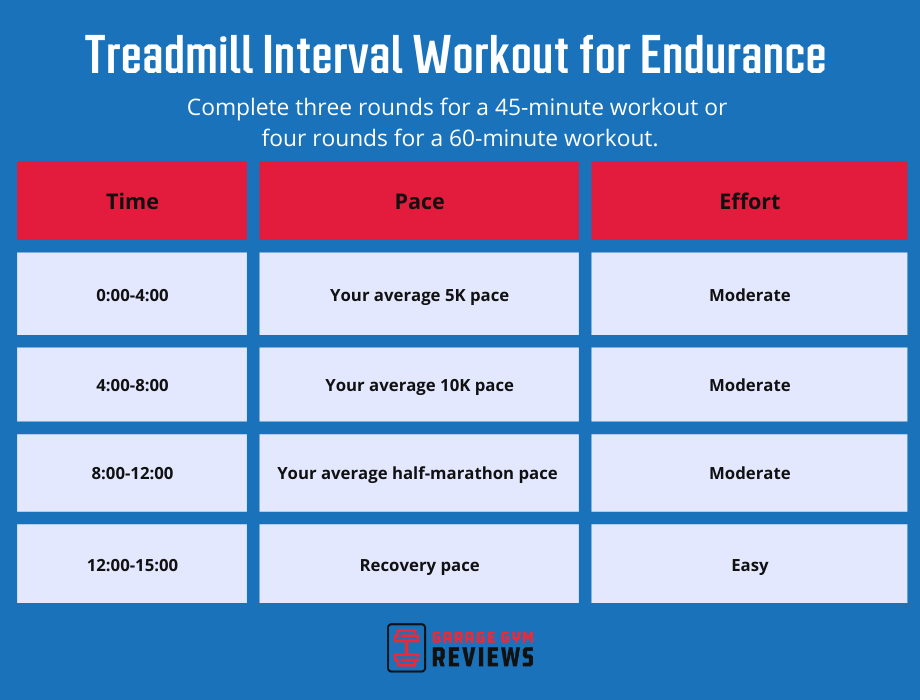
| Time | Pace | Effort |
| 0:00–4:00 | Your average 5K pace | Moderate |
| 4:00–8:00 | Your average 10K pace | Moderate |
| 8:00–12:00 | Your average half-marathon pace | Moderate |
| 12:00–15:00 | Recovery pace | Easy |
Treadmill Interval Workout for Stamina
Stamina is a combination of speed, power, and endurance: It refers to how long you can keep up a particular level of intensity. This workout is long and intense, and it’s best suited to people who have ample running experience. However, as long as it’s paced correctly, it’s even doable for beginners.
- Total time: 25 to 50 minutes
- Fitness level: Advanced, but can be modified via pacing
- Effort level: Moderate to vigorous
Complete once for a 25-minute workout and twice for a 50-minute workout.
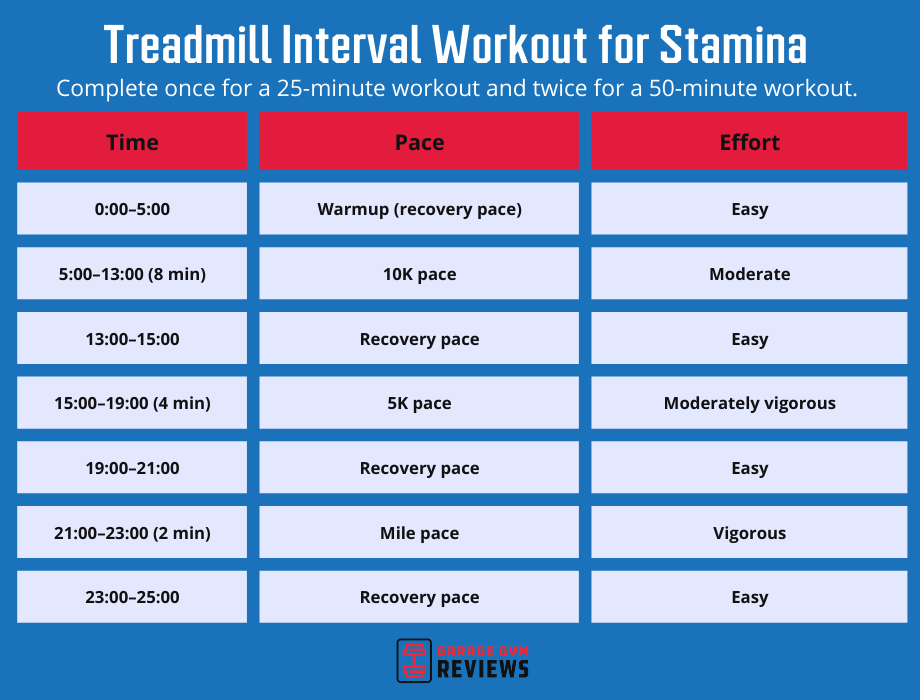
| Time | Pace | Effort |
| 0:00–5:00 | Warmup (Recovery pace) | Easy |
| 5:00–13:00 (8 min) | 10K pace | Moderate |
| 13:00–15:00 | Recovery pace | Easy |
| 15:00–19:00 (4 min) | 5K pace | Moderate |
| 19:00–21:00 | Recovery pace | Easy |
| 21:00–23:00 (2 min) | Mile pace | Vigorous |
| 23:00–25:00 | Recovery pace | Easy |
HIIT Treadmill Workout
This HIIT treadmill workout is best for intermediate to advanced runners who know their limits: You should know how to push yourself, but not overexert.
- Total time: 15 minutes
- Fitness level: Intermediate to advanced
- Effort level: Vigorous
Complete five rounds for a 15-minute workout. If you’re really maxing out your effort during the 30-second intervals, you shouldn’t be able to do much more than 15 minutes.
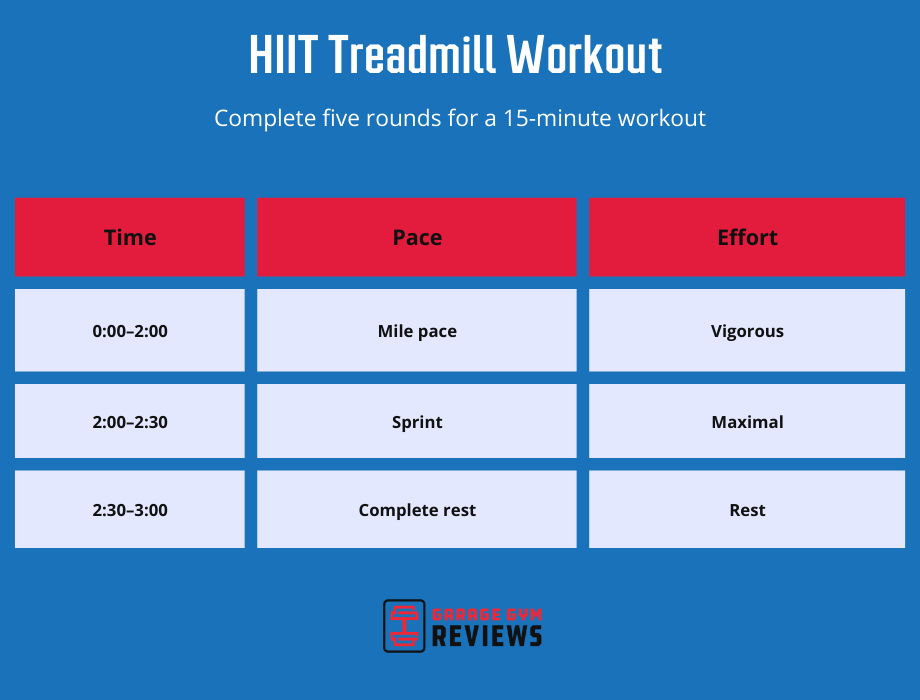
| Time | Pace | Effort |
| 0:00–2:00 | Mile pace | Vigorous |
| 2:00–2:30 | Sprint | Maximal |
| 2:30–3:00 | Complete rest | Rest |
Tabata Treadmill Workout
Looking for something super quick yet super effective? Try this tabata workout, which lasts a total of just eight minutes! This workout is based on intensity level, rather than average paces, like the others.
- Total time: 8 minutes
- Fitness level: All levels
- Effort level: Vigorous
Complete eight rounds of the following. You can make this workout longer by adding more rounds if you want.
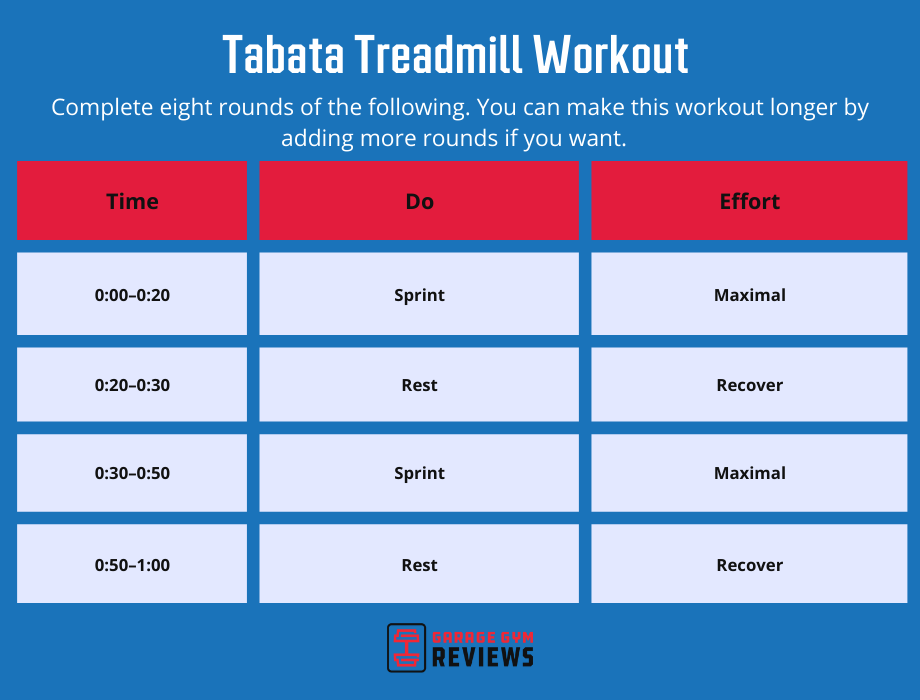
| Time | Do | Effort |
| 0:00–0:20 | Sprint | Maximal |
| 0:20–0:30 | Rest | Recover |
| 0:30–0:50 | Sprint | Maximal |
| 0:50–1:00 | Rest | Recover |
Don’t Forget to Warm Up and Cool Down
Whichever workout you choose to do, make sure you warm up and cool down properly. I’ve created a warm-up and cool-down for you to do: They’ll work no matter your fitness level and for any workout you decide on.
Warm-Up
This will get your glutes and hamstrings firing, as well as increase your heart rate and get blood flowing to all of the muscles you need for a successful run.
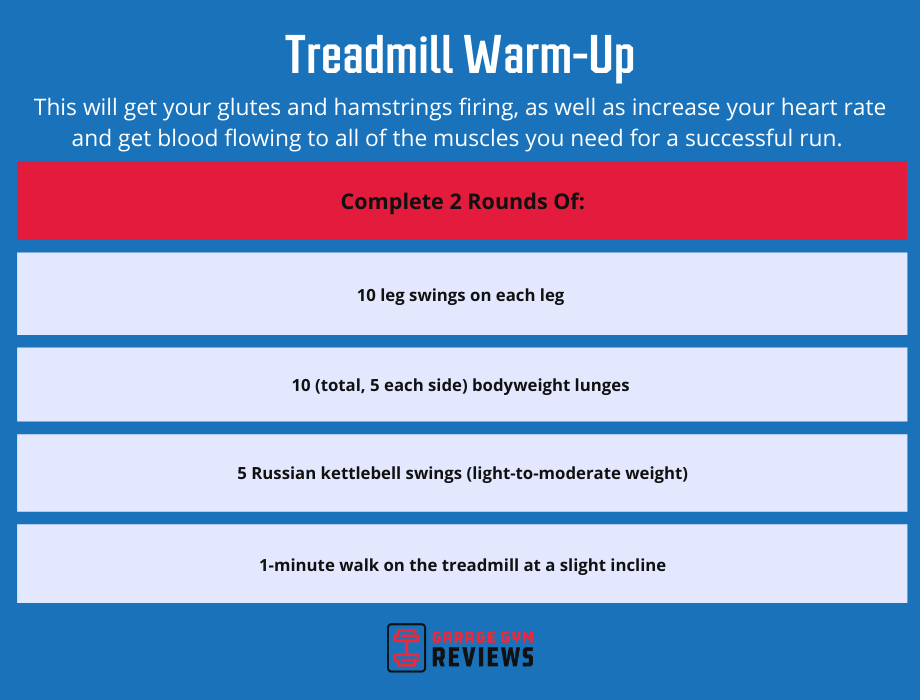
Complete two rounds of:
- 10 leg swings on each leg
- 10 (total, 5 each side) bodyweight lunges
- 5 Russian kettlebell swings (light-to-moderate weight)
- 1-minute walk on the treadmill at a slight incline
Cool-Down
This will help bring your body from an active, heightened state back to a resting state.
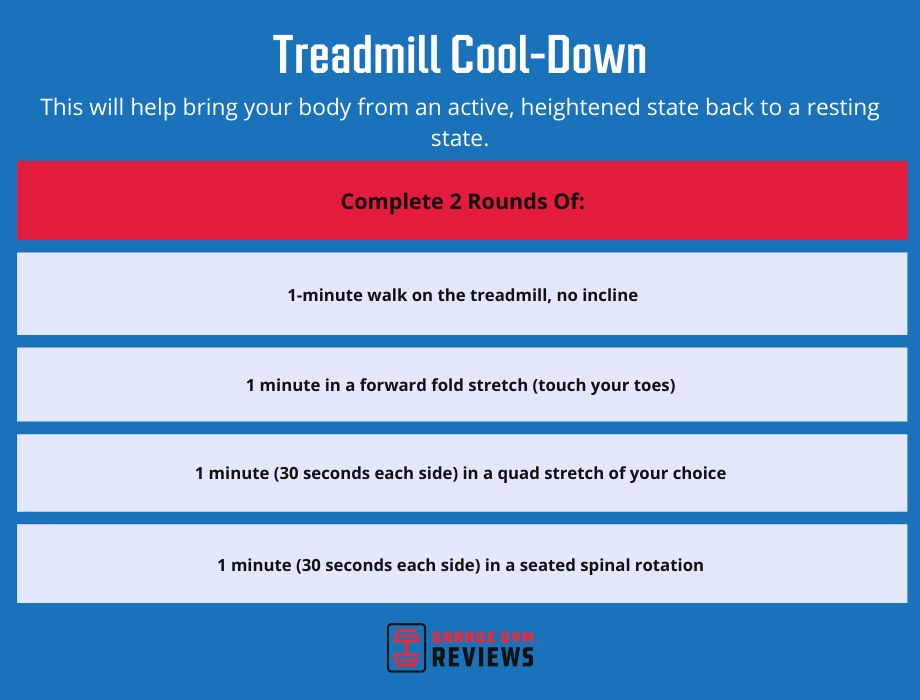
Complete two rounds of:
- 1-minute walk on the treadmill, no incline
- 1 minute in a forward fold stretch (touch your toes)
- 1 minute (30 seconds each side) in a quad stretch of your choice
- 1 minute (30 seconds each side) in a seated spinal rotation
Benefits of Interval Training on a Treadmill
Interval training, often referred to as bootcamp-style training, has many benefits. For starters, it’s a great way to increase your VO2 max, AKA the amount of oxygen your body is able to consume and utilize during exercise. Interval workouts are also a phenomenal tool for building speed and power, which will allow you to move further with every stride.
Additionally, interval training provides all of the usual benefits of cardio workouts, including (but not limited to): lower resting heart rate; improved health of your lungs, heart, and blood vessels; muscular endurance and cardiovascular endurance; stronger bones and joints; and improved mental health.
“Interval training on a treadmill is great for increasing endurance and cardiovascular fitness overall, as well as increasing calorie burn, if that’s your goal,” adds Nicole Davis, certified personal trainer and editor at Garage Gym Reviews. “By varying the speed or incline you’ll keep your body guessing—during the harder work periods you’ll be pushing it, and during the lower-intensity periods you’ll have time to recover.”
Interval Training vs Steady-State Training
Broadly, interval training refers to any workout that includes periods of work followed by periods of rest or lower-intensity work. In contrast, steady-state training refers to any workout that involves moving at the same pace for the entire duration of the session.
All of the workouts provided above are examples of interval training. Here are some examples of steady-state workouts:
- A one-mile time trial
- Running a 5K
- Running a 10K
- And so forth
Generally, steady-state workouts are longer in duration than interval workouts, but not always (example: one-mile run test).
Both types of training have their own benefits, but ultimately, both will result in improved running capacity and cardiovascular health.
If you’re not sure which type is best for you, take it from Nicole, personal trainer and GGR editor: “Interval training can improve your aerobic capacity, but does place higher stress on the body than steady-state running. Steady-state running still definitely has its place though—it’s great for your endurance. But, conversely, you won’t burn as many calories over the same amount of time, meaning 10 minutes of interval training will (in most cases) burn more calories than 10 minutes of steady-state running.”
RELATED: Treadmill HIIT Workout
FAQs About Treadmill Interval Training Workouts
How long should the rest periods be during a treadmill interval workout?
The amount of time you rest during running workouts will vary depending on the type of workout and your fitness level. A recovery period can range from as low as 15 seconds up to two minutes or more, depending on the structure of the workout.
Is a treadmill HIIT workout better than running at a steady pace?
During a high-intensity interval training (HIIT) workout, you’ll run at a very hard effort for short bursts. During a steady-state running workout, you’ll run for longer periods of time at effort levels ranging from an easy pace to a moderate pace. While these two types of workouts are very different, one isn’t necessarily better than the other. High-intensity workouts are great for building speed and power, while longer, slower workouts are best for building endurance.
What are the benefits of HIIT?
HIIT training, whether done on a treadmill or performing an elliptical HIIT workout, has many health benefits, including: improved cardiovascular health, lower resting heart rate, weight loss and fat loss (in conjunction with other healthy habits), and increased VO2 max (oxygen consumption).
Is it enough to do an easy jog at a comfortable pace?
High-intensity exercise is not the only good type of exercise. In fact, a well-rounded workout routine will certainly include low-intensity work in addition to the higher-volume, higher-intensity sessions. A light jog can be beneficial in many ways. It still provides ample cardiovascular health benefits and can give you a mental and physical break from the tough stuff, which is important for warding off overtraining syndrome.
Can you do cardio workouts and strength training together?
Absolutely. For the general population and recreational trainees, cardio and strength training should be included in your routine. It can be hard to balance both, but both types of training provide crucial health benefits. Even if you’re an avid runner who’s competing in races, strength training will still prove beneficial, not disadvantageous, to your goals—learn more about that in our guide to cross-training exercises for endurance athletes.
Further reading

This discontinued cardio machine still has quite a bit to offer, if you find one second-hand. In our NordicTrack T 6.7 S treadmill review, find out what, and which machine you should look at as an alternative. Read more

Looking to become a better runner? Whether speed or distance is your goal, a GGR personal trainer has you covered. Runners, rejoice: If you’re tired of making up your own workouts, these five workouts can carry you through some of your next few sessions. I created all of these workouts based on my experience as a personal trainer, former cross-country runner and running coach, and recently as a self-coached Olympic-distance triathlete.. From beginners to advanced athletes, » Read more about: Build Speed and Stamina With These Treadmill Interval Training Workouts » Read more

We hand-picked the best heart-healthy meal delivery services that beat going to the grocery store and meal prepping. Read more

Looking to become a better runner? Whether speed or distance is your goal, a GGR personal trainer has you covered. Runners, rejoice: If you’re tired of making up your own workouts, these five workouts can carry you through some of your next few sessions. I created all of these workouts based on my experience as a personal trainer, former cross-country runner and running coach, and recently as a self-coached Olympic-distance triathlete.. From beginners to advanced athletes, » Read more about: Build Speed and Stamina With These Treadmill Interval Training Workouts » Read more

